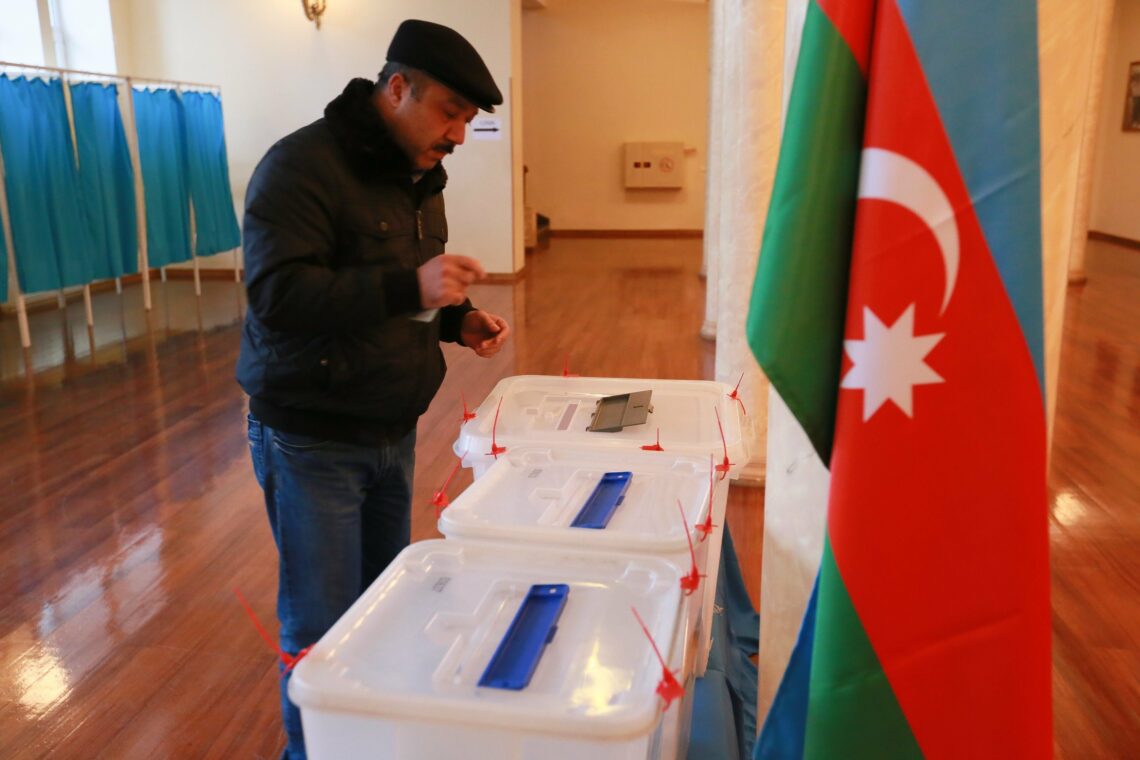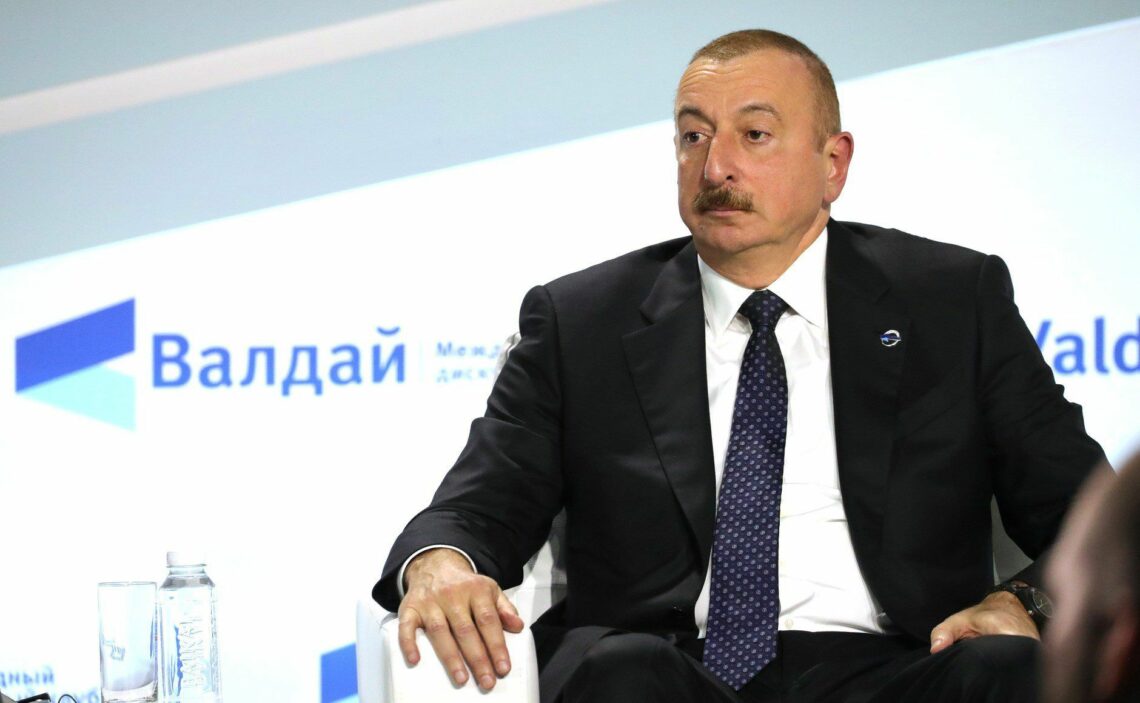Azerbaijan takes a triple hit
Baku has been able to keep a tight lid on the opposition while increasing its influence in the South Caucasus. However, the shock in oil prices caused by the Covid-19 pandemic comes at a time of severe political and economic instability in Azerbaijan.

In a nutshell
- Azerbaijan was hard hit by the crash in oil prices
- Economic turmoil could worsen political unrest
- If the pandemic lasts, Baku could lose its regional status
Azerbaijan is a petrostate in the fullest sense of the word. The energy sector accounts for over 90 percent of exports and the long-lived authoritarian regime in Baku routinely shrugs off complaints about human rights abuses. Coasting on a steady inflow of revenue from vast offshore oil and gas fields in the Caspian Sea, the ruling Aliyev dynasty has been able to cement its hold on power while transforming the country beyond recognition.
Baku’s most important geopolitical achievement has been to curb the influence of Russia in the neighborhood. By entering into multibillion-dollar agreements with Western energy companies, President Ilham Aliyev has laid the foundation for a robustly independent foreign policy. The country has emerged as an important regional energy hub with a powerful military, a combination that makes it a key player in the strategic South Caucasus region.
Triple shock
Three recent events have sent shock waves through Azeri politics, raising serious questions about future developments. The first was the outcome of snap elections held in February, which left the regime badly shaken. The second was the feud between Russia and Saudi Arabia over production cuts, which sent oil prices into a tailspin, and the third was the coronavirus outbreak, the ultimate outcome of which remains uncertain. While all three phenomena harbor threats of their own, with potentially serious long-term implications, the combined short-term damage will likely only be moderate. The impact of the pandemic on Azerbaijan may, paradoxically, even turn out to be a boon for President Ilham Aliyev and his regime.
Azerbaijan is a petrostate in the fullest sense of the word.
The darkest cloud is the collapse in global energy demand, which struck when things had been looking rosy for the Azerbaijani oil sector. The $6.5 billion Trans-Anatolian Gas Pipeline (TANAP) had just opened, in November 2019. The state oil company, SOCAR, had been getting ready to start exploiting a new field in the Caspian.
The turmoil that followed after March 9, when the price for Brent crude tumbled to $32.38, has been considerably more dramatic than during the global financial crisis in 2008-2009. Governments across the world have been forced to introduce stimulus packages and to rewrite economic forecasts. Azerbaijan will feel the damage. According to International Monetary Fund data, Baku needs oil at around $53 per barrel to balance its budget. In Russia, the federal budget breaks even at $42.40. This said, compared to many countries on the frontline of the coronavirus pandemic, Azerbaijan remains in reasonably good shape.
The upside for Baku is that it has deep pockets. By the end of 2019, its external debt was below 18 percent of gross domestic product (GDP), just above Russia’s (at 14 percent to GDP), and its foreign currency reserves were six times its foreign debt. In mid-March, the country’s central bank expressed confidence that it would be able to meet any challenge, and that Azerbaijan had the potential to “balance the situation without making any emotional decisions.”
If the virus does recede, and there is a swift bounce back in economic activity that causes energy markets to revive, then Baku may come out of the crisis bruised but not seriously damaged.
The same is true from a health perspective. The initial reaction from the Azerbaijani government was to simply shrug off the pandemic. It delayed closing its border with neighboring Iran until February 29, when it detected its own first three COVID-19 cases. In early March, the government was still complacent, announcing donations of $5 million to both Iran and the World Health Organization to help fight the pandemic. Then, it suddenly began asking for donations from citizens, organizations and businesses to deal with the disease.
Despite mounting concern, Azerbaijan is likely to weather the first coronavirus wave with comparatively limited medical casualties. The number of confirmed new infections peaked in early April, with a daily rate of just above 100. By the end of the month, it had only 1,717 confirmed cases and 22 deaths.
There has been widespread skepticism about the veracity of official numbers in Iran, and those for Azerbaijan must be also taken with a grain of salt. Yet Azerbaijani social media users have not been questioning the authorities’ version.

Political instability
Even before the COVID-19 outbreak, the political situation in Baku was fragile. In early December 2019, the parliament voted to dissolve itself, calling for snap elections to be held on February 6. For unclear reasons, the government deliberately created expectations that the vote would be held in unprecedented freedom. President Aliyev suggested that authorities would “give young cadres the possibility to show their capabilities.” An international effort was launched to portray the election as a new step in the country’s development.
The outcome was a debacle. Having first raised hopes about a completely free vote, the government resorted to traditional methods of electoral falsification and harsh crackdowns on protest. As the elections approached, police detained opposition leaders in Baku, drove them for hours outside of town, and left them in the middle of nowhere.
Even before the COVID-19 outbreak, the political situation was fragile.
The coronavirus offered the regime an excuse to come down hard on the opposition. In his address to the nation for the Nowruz spring holiday on March 19, Mr. Aliyev targeted opposition figures, accusing them of taking advantage of the coronavirus to sow panic: “We cannot allow the anti-Azerbaijani forces, the fifth column, national traitors, to take advantage of this situation, to commit any provocation.”
While using the pandemic as a pretext for an authoritarian power grab is clearly not unique to Azerbaijan, it will have negative implications for the prospects of liberalization, which could have improved flagging economic performance. The country could find itself increasingly isolated on the international scene, especially after the election of Nikol Pashinyan as president of neighboring Armenia. In the long-standing conflict over the contested region of Nagorno-Karabakh, foreign powers will naturally favor a democratically-elected leader.
Scenarios
Any developments beyond the coming months will depend on the virus and a possible second wave of infection. If the latter does not materialize or the spikes are small, then Azerbaijan may come out of the crisis in good shape.
A broad increase in energy demand could further improve the situation. Baku might not only consolidate its budget and begin rebuilding its strategic reserves, it could also develop the new Karabagh oil field, gaining foreign policy clout.
The recently completed TANAP gas pipeline is the longest in a series of channels that make up the Southern Gas Corridor, a $40 billion project to carry gas from Azerbaijan’s Shah Deniz II field across Turkey into Europe. Along with the existing Baku-Tbilisi-Ceyhan oil pipeline, the new infrastructure puts Ankara and Baku at the center of a regional energy hub. According to Turkish import data, Russia and Azerbaijan are competing for markets, and Baku is on the winning side.
While Turkey’s overall gas imports fell by 10 percent last year, supplies from Azerbaijan increased by 29 percent, leaving Russian Gazprom with a drop of 40 percent. An alternative scenario, where energy demand remains weak over the long term, would have dramatically different implications for Azerbaijan.
If its reserves are exhausted, which could happen swiftly, the regime would have to resort to severe austerity measures that could result in political instability. Although the Aliyev dynasty is likely to retain its grip on power, its room for playing an independent role in foreign policy will be constrained.
In January this year, President Aliyev said Baku was willing to consider shipping Russian gas to Europe through TANAP and the associated Trans-Adriatic (TAP) gas pipeline that is scheduled to open this year. That would be a win for Moscow and a major blow to Brussels, which is seeking to diversify away from Russian gas.
Yet, in February, Baku also intervened between Minsk and Moscow in a long-running conflict over Russian oil that Belarus purchases at a discount and reexports as gasoline to Europe. Russia has been demanding an end to the discounts, which would seriously harm Belarus. On February 26, it was announced that Azerbaijan's SOCAR would sell 160,000 tons of oil to Minsk.
Even short of a worst-case scenario, a protracted slump in energy demand coupled with the lingering threat of a spike in new infections would seriously undermine Azerbaijan’s ability to play power games. Deprived of the bulk of its petrodollar income, Baku would face a choice between cutting social payments, which account for 65 percent of the state budget, and military spending, which would undermine its posture in the conflict over Nagorno-Karabakh. It would become highly vulnerable to pressure from the Kremlin, which has already been hinting that it could step up its support for Armenia.
Longer-term, it could be that the days when Azerbaijan was able to play a key role in the South Caucasus are coming to an end, and the region will revert to an arena for power play between Russia and Turkey.







